Artificial Intelligence in Accounting: Future Impact Analysis
VerifiedAdded on 2022/08/21
|9
|1950
|12
Report
AI Summary
This report delves into the profound impact of Artificial Intelligence (AI) and integrated data transfer on the accounting sector. It examines how AI tools and techniques are revolutionizing various processes, including data entry, digital payment methods, automatic processes, security management, and credit score assessment. The report highlights the significance of integrated data transfer, emphasizing the role of blockchain in enhancing security and efficiency. Furthermore, it discusses the benefits of AI in data transfers, such as bank reconciliation and automated invoice management, and explores the impact of cloud computing and robotic process automation. The report concludes that AI and machine learning (ML) will be integral to the future of accounting, driving improvements in productivity, accuracy, and performance. It also touches upon the ethical issues related to the internet and its impacts on accounting information systems. Finally, it emphasizes the importance of integrating new technologies to manage and control the challenges of the accounting sector, which are essential for the future of this industry.
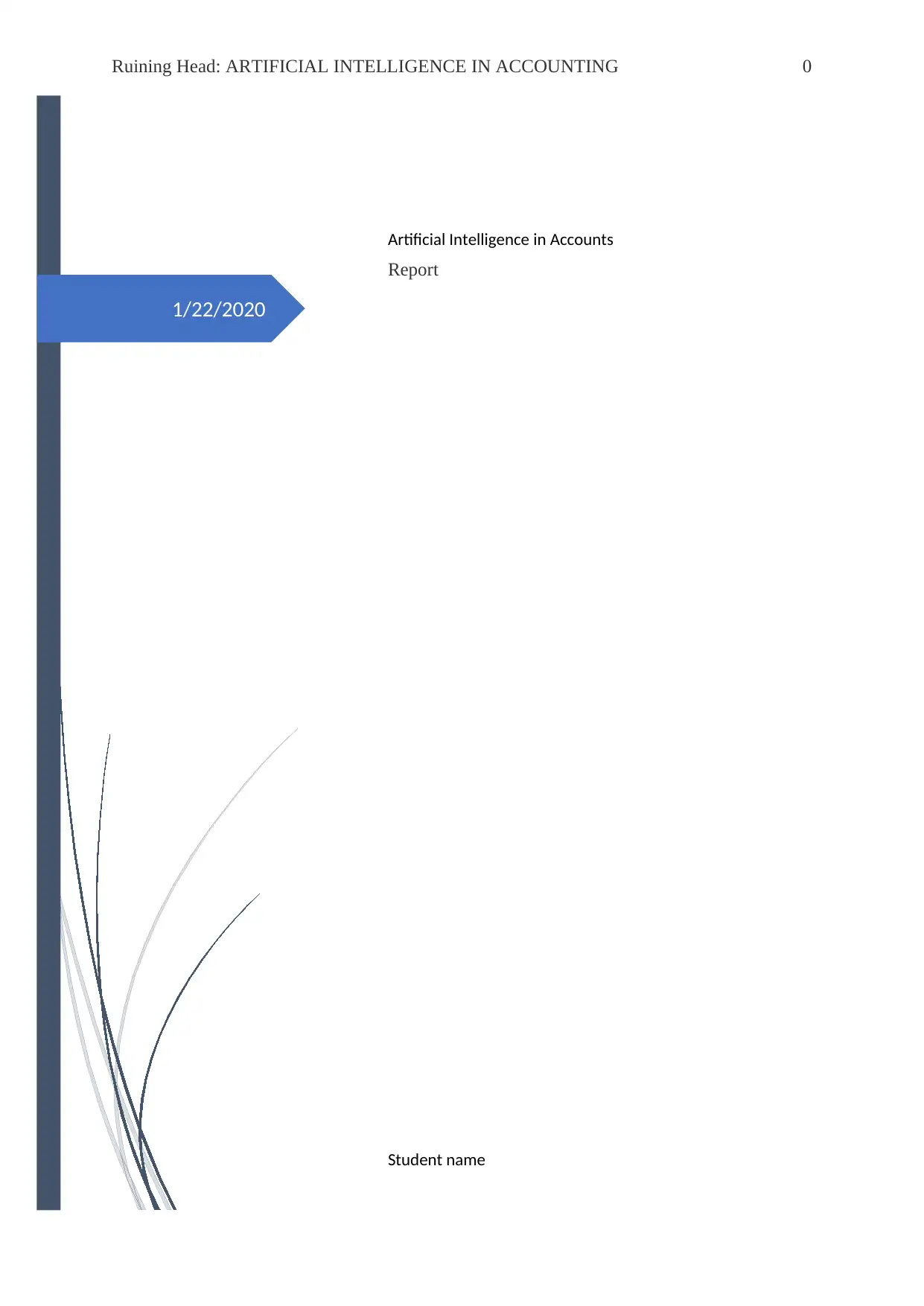
1/22/2020
Ruining Head: ARTIFICIAL INTELLIGENCE IN ACCOUNTING 0
Artificial Intelligence in Accounts
Report
Student name
Ruining Head: ARTIFICIAL INTELLIGENCE IN ACCOUNTING 0
Artificial Intelligence in Accounts
Report
Student name
Paraphrase This Document
Need a fresh take? Get an instant paraphrase of this document with our AI Paraphraser
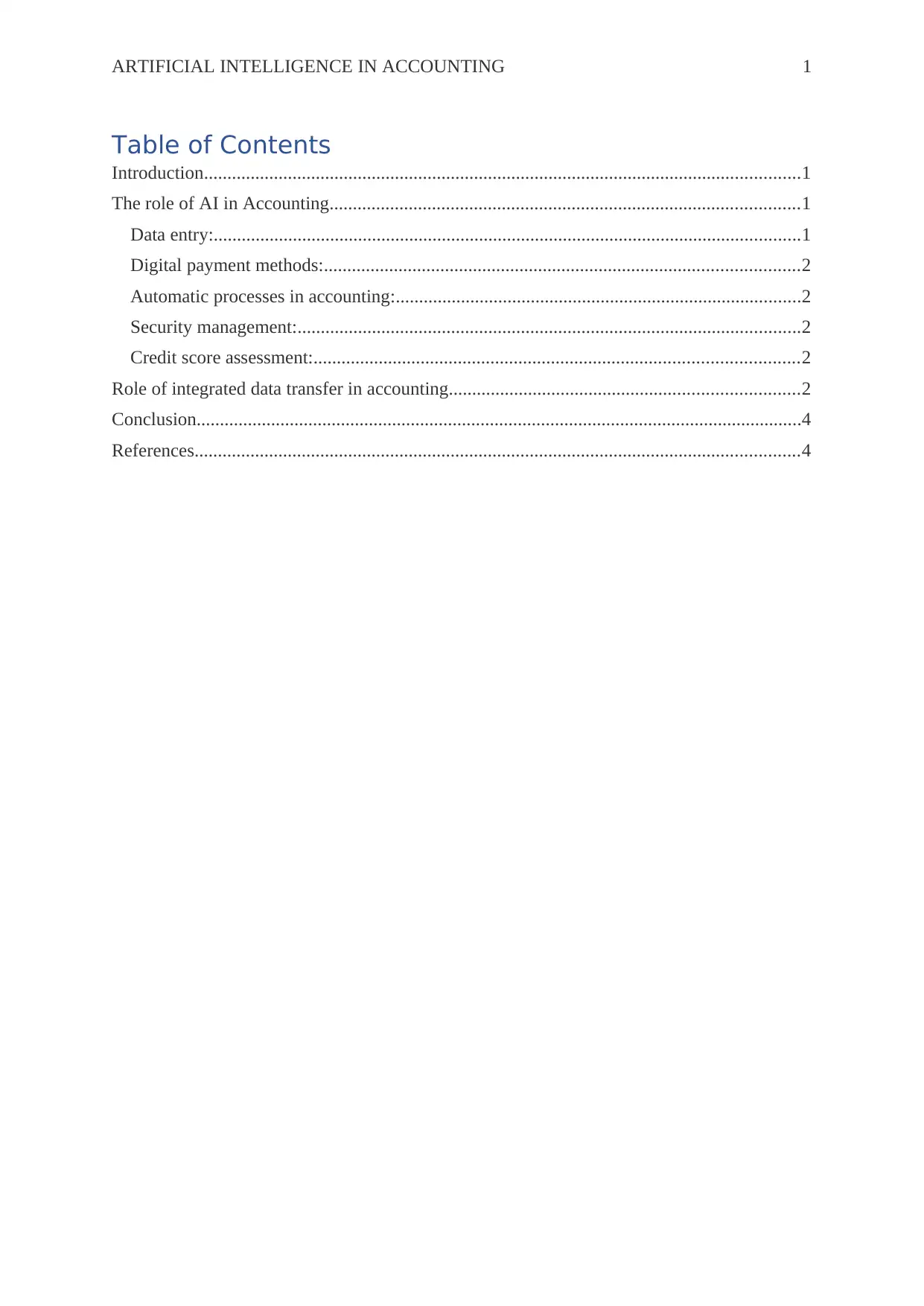
ARTIFICIAL INTELLIGENCE IN ACCOUNTING 1
Table of Contents
Introduction................................................................................................................................1
The role of AI in Accounting.....................................................................................................1
Data entry:..............................................................................................................................1
Digital payment methods:......................................................................................................2
Automatic processes in accounting:.......................................................................................2
Security management:............................................................................................................2
Credit score assessment:........................................................................................................2
Role of integrated data transfer in accounting...........................................................................2
Conclusion..................................................................................................................................4
References..................................................................................................................................4
Table of Contents
Introduction................................................................................................................................1
The role of AI in Accounting.....................................................................................................1
Data entry:..............................................................................................................................1
Digital payment methods:......................................................................................................2
Automatic processes in accounting:.......................................................................................2
Security management:............................................................................................................2
Credit score assessment:........................................................................................................2
Role of integrated data transfer in accounting...........................................................................2
Conclusion..................................................................................................................................4
References..................................................................................................................................4
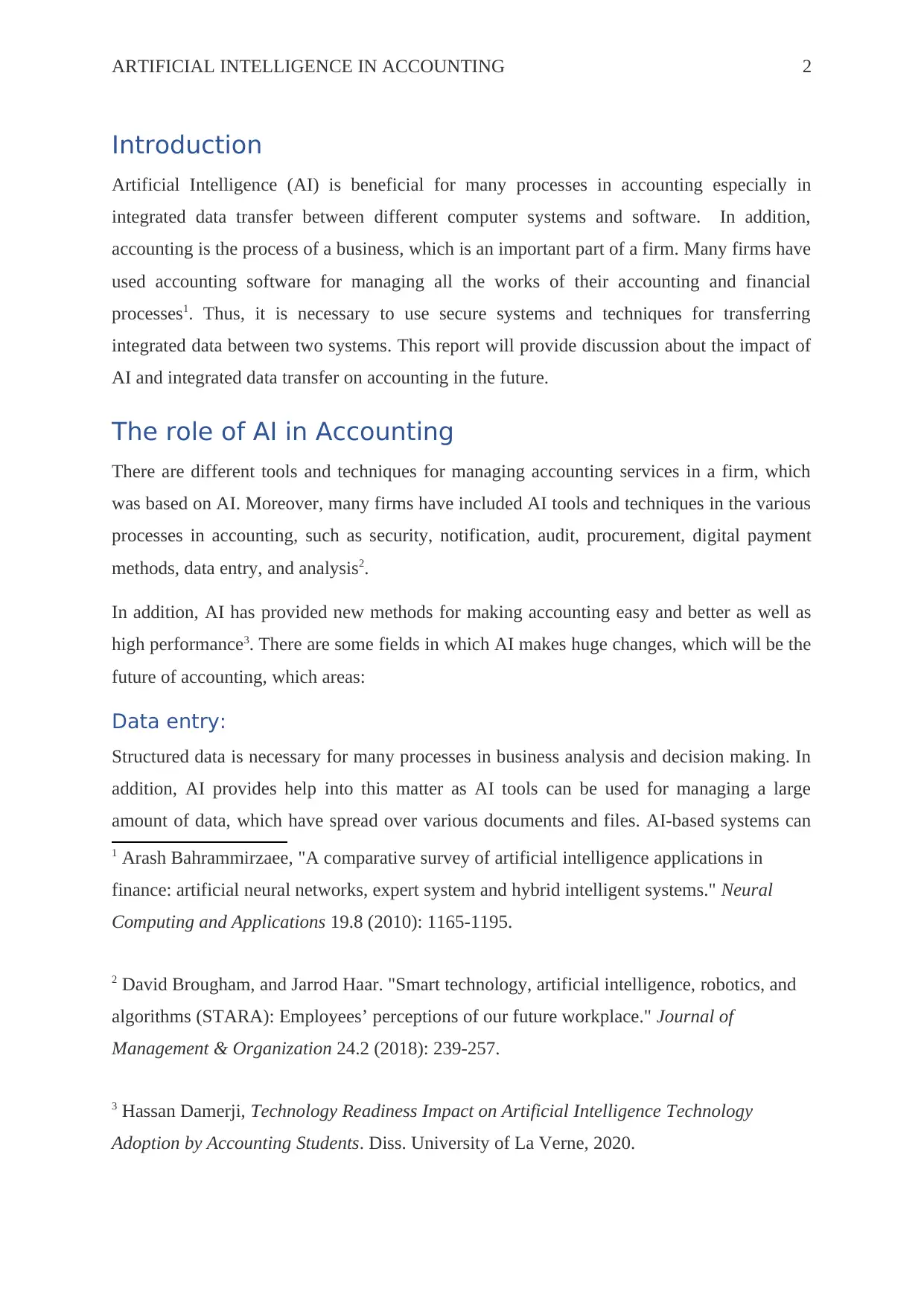
ARTIFICIAL INTELLIGENCE IN ACCOUNTING 2
Introduction
Artificial Intelligence (AI) is beneficial for many processes in accounting especially in
integrated data transfer between different computer systems and software. In addition,
accounting is the process of a business, which is an important part of a firm. Many firms have
used accounting software for managing all the works of their accounting and financial
processes1. Thus, it is necessary to use secure systems and techniques for transferring
integrated data between two systems. This report will provide discussion about the impact of
AI and integrated data transfer on accounting in the future.
The role of AI in Accounting
There are different tools and techniques for managing accounting services in a firm, which
was based on AI. Moreover, many firms have included AI tools and techniques in the various
processes in accounting, such as security, notification, audit, procurement, digital payment
methods, data entry, and analysis2.
In addition, AI has provided new methods for making accounting easy and better as well as
high performance3. There are some fields in which AI makes huge changes, which will be the
future of accounting, which areas:
Data entry:
Structured data is necessary for many processes in business analysis and decision making. In
addition, AI provides help into this matter as AI tools can be used for managing a large
amount of data, which have spread over various documents and files. AI-based systems can
1 Arash Bahrammirzaee, "A comparative survey of artificial intelligence applications in
finance: artificial neural networks, expert system and hybrid intelligent systems." Neural
Computing and Applications 19.8 (2010): 1165-1195.
2 David Brougham, and Jarrod Haar. "Smart technology, artificial intelligence, robotics, and
algorithms (STARA): Employees’ perceptions of our future workplace." Journal of
Management & Organization 24.2 (2018): 239-257.
3 Hassan Damerji, Technology Readiness Impact on Artificial Intelligence Technology
Adoption by Accounting Students. Diss. University of La Verne, 2020.
Introduction
Artificial Intelligence (AI) is beneficial for many processes in accounting especially in
integrated data transfer between different computer systems and software. In addition,
accounting is the process of a business, which is an important part of a firm. Many firms have
used accounting software for managing all the works of their accounting and financial
processes1. Thus, it is necessary to use secure systems and techniques for transferring
integrated data between two systems. This report will provide discussion about the impact of
AI and integrated data transfer on accounting in the future.
The role of AI in Accounting
There are different tools and techniques for managing accounting services in a firm, which
was based on AI. Moreover, many firms have included AI tools and techniques in the various
processes in accounting, such as security, notification, audit, procurement, digital payment
methods, data entry, and analysis2.
In addition, AI has provided new methods for making accounting easy and better as well as
high performance3. There are some fields in which AI makes huge changes, which will be the
future of accounting, which areas:
Data entry:
Structured data is necessary for many processes in business analysis and decision making. In
addition, AI provides help into this matter as AI tools can be used for managing a large
amount of data, which have spread over various documents and files. AI-based systems can
1 Arash Bahrammirzaee, "A comparative survey of artificial intelligence applications in
finance: artificial neural networks, expert system and hybrid intelligent systems." Neural
Computing and Applications 19.8 (2010): 1165-1195.
2 David Brougham, and Jarrod Haar. "Smart technology, artificial intelligence, robotics, and
algorithms (STARA): Employees’ perceptions of our future workplace." Journal of
Management & Organization 24.2 (2018): 239-257.
3 Hassan Damerji, Technology Readiness Impact on Artificial Intelligence Technology
Adoption by Accounting Students. Diss. University of La Verne, 2020.
⊘ This is a preview!⊘
Do you want full access?
Subscribe today to unlock all pages.

Trusted by 1+ million students worldwide
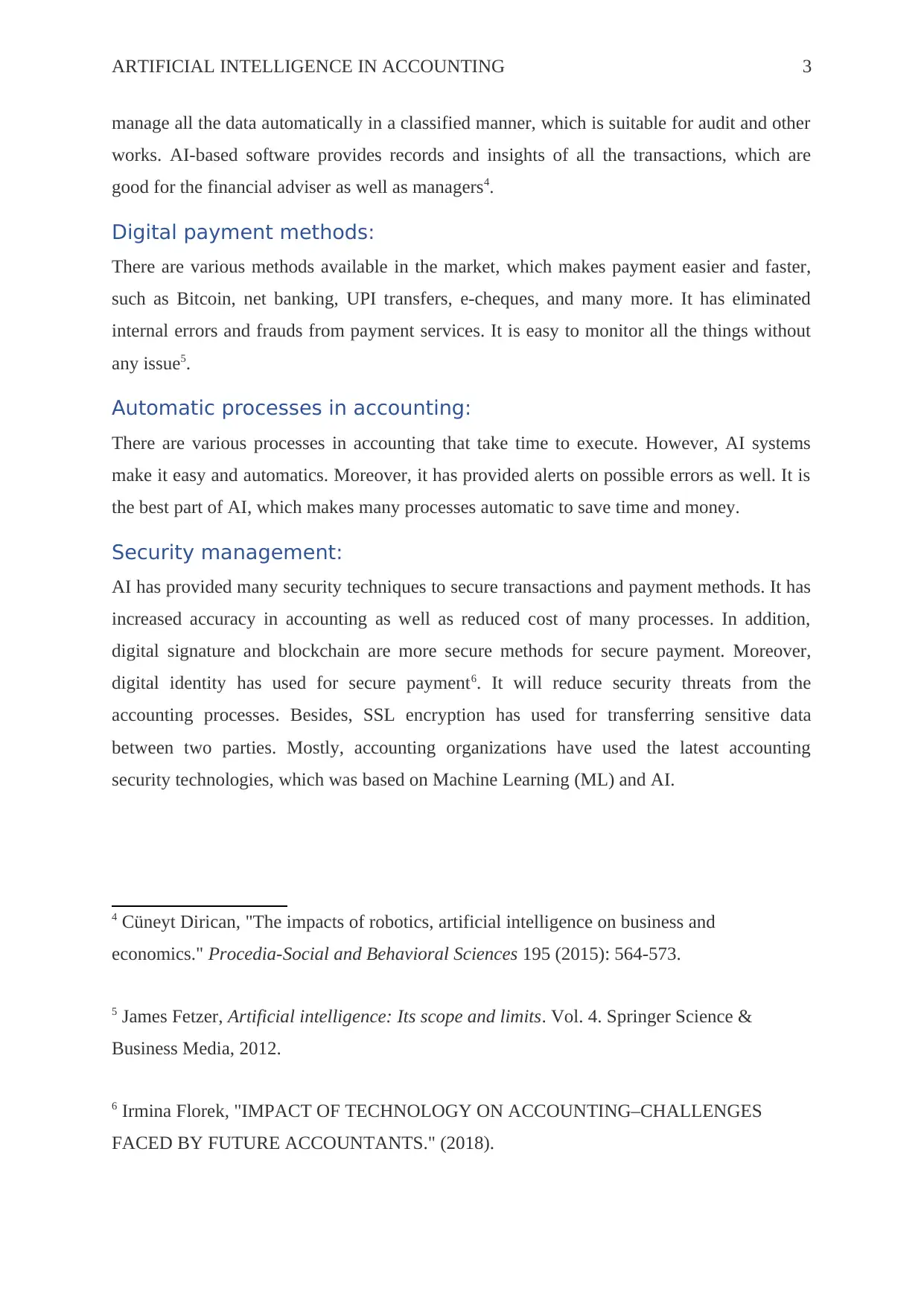
ARTIFICIAL INTELLIGENCE IN ACCOUNTING 3
manage all the data automatically in a classified manner, which is suitable for audit and other
works. AI-based software provides records and insights of all the transactions, which are
good for the financial adviser as well as managers4.
Digital payment methods:
There are various methods available in the market, which makes payment easier and faster,
such as Bitcoin, net banking, UPI transfers, e-cheques, and many more. It has eliminated
internal errors and frauds from payment services. It is easy to monitor all the things without
any issue5.
Automatic processes in accounting:
There are various processes in accounting that take time to execute. However, AI systems
make it easy and automatics. Moreover, it has provided alerts on possible errors as well. It is
the best part of AI, which makes many processes automatic to save time and money.
Security management:
AI has provided many security techniques to secure transactions and payment methods. It has
increased accuracy in accounting as well as reduced cost of many processes. In addition,
digital signature and blockchain are more secure methods for secure payment. Moreover,
digital identity has used for secure payment6. It will reduce security threats from the
accounting processes. Besides, SSL encryption has used for transferring sensitive data
between two parties. Mostly, accounting organizations have used the latest accounting
security technologies, which was based on Machine Learning (ML) and AI.
4 Cüneyt Dirican, "The impacts of robotics, artificial intelligence on business and
economics." Procedia-Social and Behavioral Sciences 195 (2015): 564-573.
5 James Fetzer, Artificial intelligence: Its scope and limits. Vol. 4. Springer Science &
Business Media, 2012.
6 Irmina Florek, "IMPACT OF TECHNOLOGY ON ACCOUNTING–CHALLENGES
FACED BY FUTURE ACCOUNTANTS." (2018).
manage all the data automatically in a classified manner, which is suitable for audit and other
works. AI-based software provides records and insights of all the transactions, which are
good for the financial adviser as well as managers4.
Digital payment methods:
There are various methods available in the market, which makes payment easier and faster,
such as Bitcoin, net banking, UPI transfers, e-cheques, and many more. It has eliminated
internal errors and frauds from payment services. It is easy to monitor all the things without
any issue5.
Automatic processes in accounting:
There are various processes in accounting that take time to execute. However, AI systems
make it easy and automatics. Moreover, it has provided alerts on possible errors as well. It is
the best part of AI, which makes many processes automatic to save time and money.
Security management:
AI has provided many security techniques to secure transactions and payment methods. It has
increased accuracy in accounting as well as reduced cost of many processes. In addition,
digital signature and blockchain are more secure methods for secure payment. Moreover,
digital identity has used for secure payment6. It will reduce security threats from the
accounting processes. Besides, SSL encryption has used for transferring sensitive data
between two parties. Mostly, accounting organizations have used the latest accounting
security technologies, which was based on Machine Learning (ML) and AI.
4 Cüneyt Dirican, "The impacts of robotics, artificial intelligence on business and
economics." Procedia-Social and Behavioral Sciences 195 (2015): 564-573.
5 James Fetzer, Artificial intelligence: Its scope and limits. Vol. 4. Springer Science &
Business Media, 2012.
6 Irmina Florek, "IMPACT OF TECHNOLOGY ON ACCOUNTING–CHALLENGES
FACED BY FUTURE ACCOUNTANTS." (2018).
Paraphrase This Document
Need a fresh take? Get an instant paraphrase of this document with our AI Paraphraser
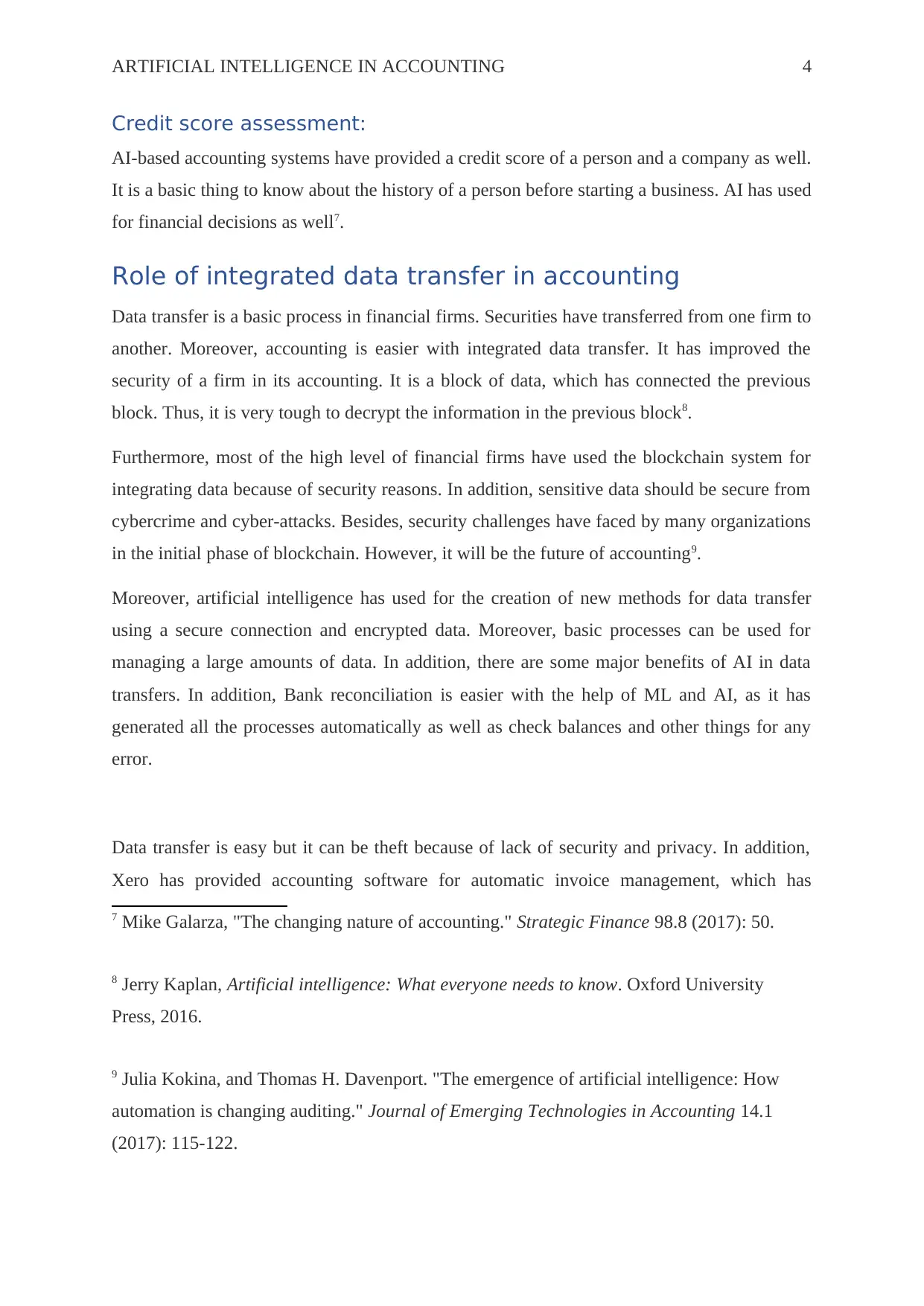
ARTIFICIAL INTELLIGENCE IN ACCOUNTING 4
Credit score assessment:
AI-based accounting systems have provided a credit score of a person and a company as well.
It is a basic thing to know about the history of a person before starting a business. AI has used
for financial decisions as well7.
Role of integrated data transfer in accounting
Data transfer is a basic process in financial firms. Securities have transferred from one firm to
another. Moreover, accounting is easier with integrated data transfer. It has improved the
security of a firm in its accounting. It is a block of data, which has connected the previous
block. Thus, it is very tough to decrypt the information in the previous block8.
Furthermore, most of the high level of financial firms have used the blockchain system for
integrating data because of security reasons. In addition, sensitive data should be secure from
cybercrime and cyber-attacks. Besides, security challenges have faced by many organizations
in the initial phase of blockchain. However, it will be the future of accounting9.
Moreover, artificial intelligence has used for the creation of new methods for data transfer
using a secure connection and encrypted data. Moreover, basic processes can be used for
managing a large amounts of data. In addition, there are some major benefits of AI in data
transfers. In addition, Bank reconciliation is easier with the help of ML and AI, as it has
generated all the processes automatically as well as check balances and other things for any
error.
Data transfer is easy but it can be theft because of lack of security and privacy. In addition,
Xero has provided accounting software for automatic invoice management, which has
7 Mike Galarza, "The changing nature of accounting." Strategic Finance 98.8 (2017): 50.
8 Jerry Kaplan, Artificial intelligence: What everyone needs to know. Oxford University
Press, 2016.
9 Julia Kokina, and Thomas H. Davenport. "The emergence of artificial intelligence: How
automation is changing auditing." Journal of Emerging Technologies in Accounting 14.1
(2017): 115-122.
Credit score assessment:
AI-based accounting systems have provided a credit score of a person and a company as well.
It is a basic thing to know about the history of a person before starting a business. AI has used
for financial decisions as well7.
Role of integrated data transfer in accounting
Data transfer is a basic process in financial firms. Securities have transferred from one firm to
another. Moreover, accounting is easier with integrated data transfer. It has improved the
security of a firm in its accounting. It is a block of data, which has connected the previous
block. Thus, it is very tough to decrypt the information in the previous block8.
Furthermore, most of the high level of financial firms have used the blockchain system for
integrating data because of security reasons. In addition, sensitive data should be secure from
cybercrime and cyber-attacks. Besides, security challenges have faced by many organizations
in the initial phase of blockchain. However, it will be the future of accounting9.
Moreover, artificial intelligence has used for the creation of new methods for data transfer
using a secure connection and encrypted data. Moreover, basic processes can be used for
managing a large amounts of data. In addition, there are some major benefits of AI in data
transfers. In addition, Bank reconciliation is easier with the help of ML and AI, as it has
generated all the processes automatically as well as check balances and other things for any
error.
Data transfer is easy but it can be theft because of lack of security and privacy. In addition,
Xero has provided accounting software for automatic invoice management, which has
7 Mike Galarza, "The changing nature of accounting." Strategic Finance 98.8 (2017): 50.
8 Jerry Kaplan, Artificial intelligence: What everyone needs to know. Oxford University
Press, 2016.
9 Julia Kokina, and Thomas H. Davenport. "The emergence of artificial intelligence: How
automation is changing auditing." Journal of Emerging Technologies in Accounting 14.1
(2017): 115-122.
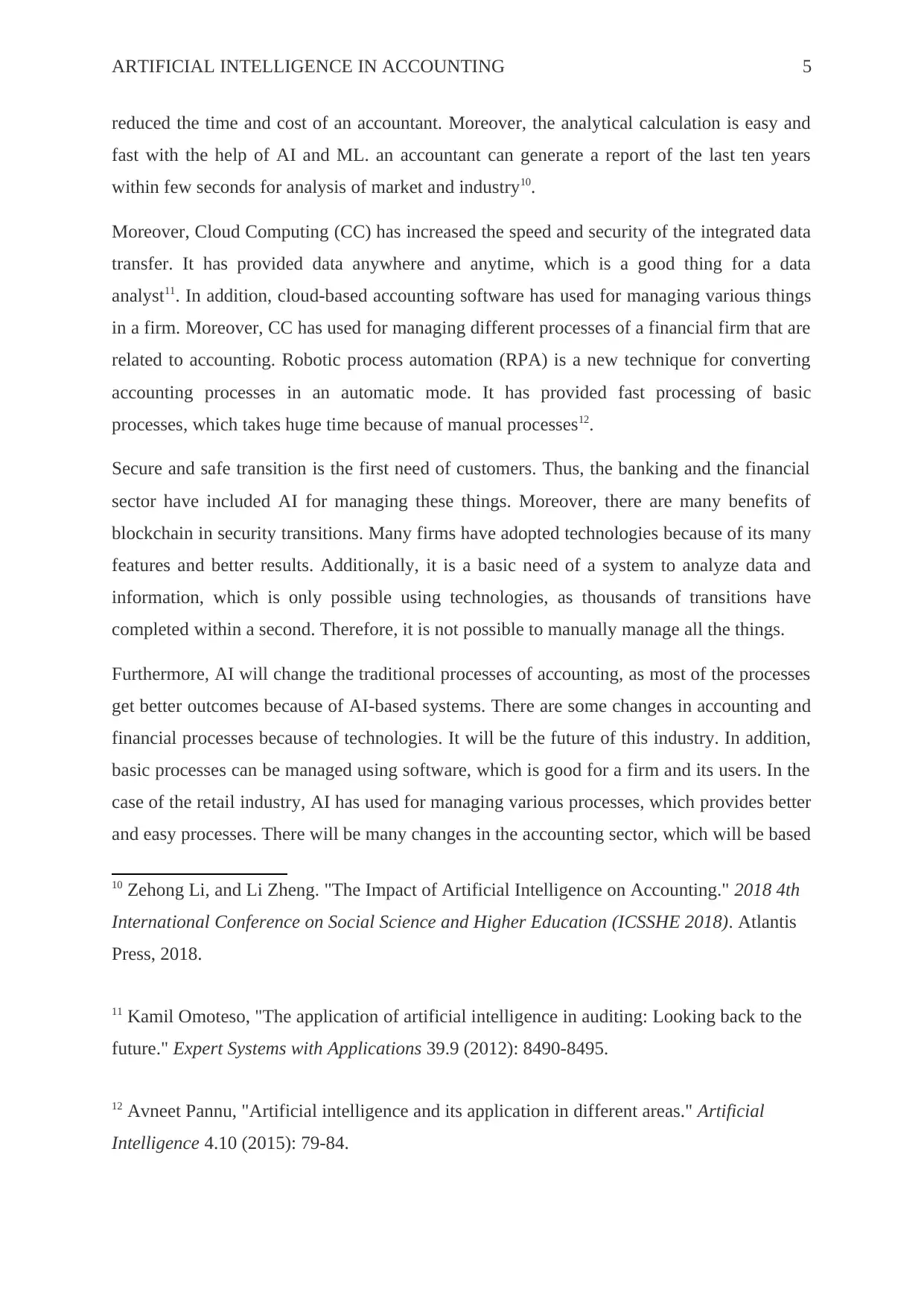
ARTIFICIAL INTELLIGENCE IN ACCOUNTING 5
reduced the time and cost of an accountant. Moreover, the analytical calculation is easy and
fast with the help of AI and ML. an accountant can generate a report of the last ten years
within few seconds for analysis of market and industry10.
Moreover, Cloud Computing (CC) has increased the speed and security of the integrated data
transfer. It has provided data anywhere and anytime, which is a good thing for a data
analyst11. In addition, cloud-based accounting software has used for managing various things
in a firm. Moreover, CC has used for managing different processes of a financial firm that are
related to accounting. Robotic process automation (RPA) is a new technique for converting
accounting processes in an automatic mode. It has provided fast processing of basic
processes, which takes huge time because of manual processes12.
Secure and safe transition is the first need of customers. Thus, the banking and the financial
sector have included AI for managing these things. Moreover, there are many benefits of
blockchain in security transitions. Many firms have adopted technologies because of its many
features and better results. Additionally, it is a basic need of a system to analyze data and
information, which is only possible using technologies, as thousands of transitions have
completed within a second. Therefore, it is not possible to manually manage all the things.
Furthermore, AI will change the traditional processes of accounting, as most of the processes
get better outcomes because of AI-based systems. There are some changes in accounting and
financial processes because of technologies. It will be the future of this industry. In addition,
basic processes can be managed using software, which is good for a firm and its users. In the
case of the retail industry, AI has used for managing various processes, which provides better
and easy processes. There will be many changes in the accounting sector, which will be based
10 Zehong Li, and Li Zheng. "The Impact of Artificial Intelligence on Accounting." 2018 4th
International Conference on Social Science and Higher Education (ICSSHE 2018). Atlantis
Press, 2018.
11 Kamil Omoteso, "The application of artificial intelligence in auditing: Looking back to the
future." Expert Systems with Applications 39.9 (2012): 8490-8495.
12 Avneet Pannu, "Artificial intelligence and its application in different areas." Artificial
Intelligence 4.10 (2015): 79-84.
reduced the time and cost of an accountant. Moreover, the analytical calculation is easy and
fast with the help of AI and ML. an accountant can generate a report of the last ten years
within few seconds for analysis of market and industry10.
Moreover, Cloud Computing (CC) has increased the speed and security of the integrated data
transfer. It has provided data anywhere and anytime, which is a good thing for a data
analyst11. In addition, cloud-based accounting software has used for managing various things
in a firm. Moreover, CC has used for managing different processes of a financial firm that are
related to accounting. Robotic process automation (RPA) is a new technique for converting
accounting processes in an automatic mode. It has provided fast processing of basic
processes, which takes huge time because of manual processes12.
Secure and safe transition is the first need of customers. Thus, the banking and the financial
sector have included AI for managing these things. Moreover, there are many benefits of
blockchain in security transitions. Many firms have adopted technologies because of its many
features and better results. Additionally, it is a basic need of a system to analyze data and
information, which is only possible using technologies, as thousands of transitions have
completed within a second. Therefore, it is not possible to manually manage all the things.
Furthermore, AI will change the traditional processes of accounting, as most of the processes
get better outcomes because of AI-based systems. There are some changes in accounting and
financial processes because of technologies. It will be the future of this industry. In addition,
basic processes can be managed using software, which is good for a firm and its users. In the
case of the retail industry, AI has used for managing various processes, which provides better
and easy processes. There will be many changes in the accounting sector, which will be based
10 Zehong Li, and Li Zheng. "The Impact of Artificial Intelligence on Accounting." 2018 4th
International Conference on Social Science and Higher Education (ICSSHE 2018). Atlantis
Press, 2018.
11 Kamil Omoteso, "The application of artificial intelligence in auditing: Looking back to the
future." Expert Systems with Applications 39.9 (2012): 8490-8495.
12 Avneet Pannu, "Artificial intelligence and its application in different areas." Artificial
Intelligence 4.10 (2015): 79-84.
⊘ This is a preview!⊘
Do you want full access?
Subscribe today to unlock all pages.

Trusted by 1+ million students worldwide
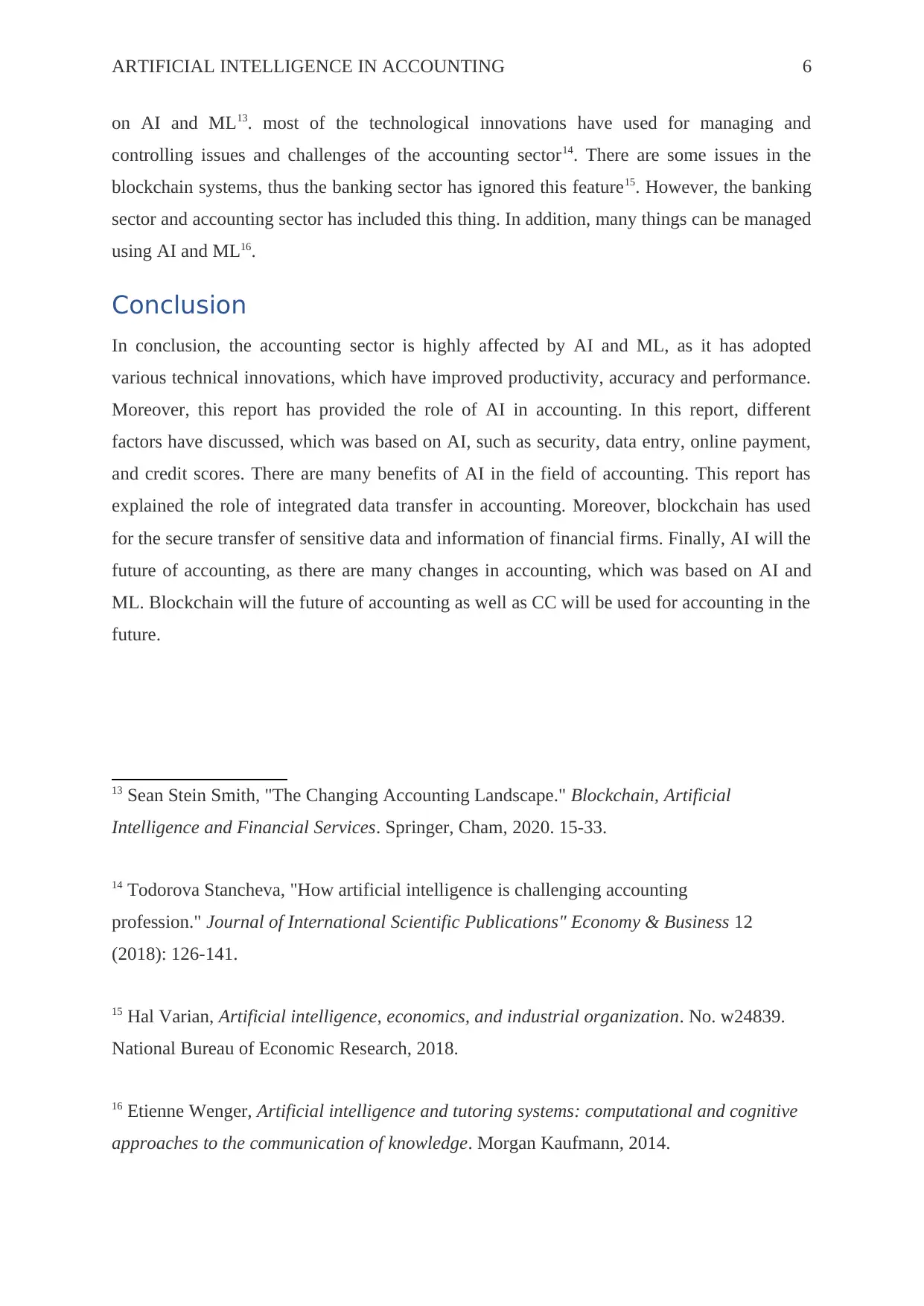
ARTIFICIAL INTELLIGENCE IN ACCOUNTING 6
on AI and ML13. most of the technological innovations have used for managing and
controlling issues and challenges of the accounting sector14. There are some issues in the
blockchain systems, thus the banking sector has ignored this feature15. However, the banking
sector and accounting sector has included this thing. In addition, many things can be managed
using AI and ML16.
Conclusion
In conclusion, the accounting sector is highly affected by AI and ML, as it has adopted
various technical innovations, which have improved productivity, accuracy and performance.
Moreover, this report has provided the role of AI in accounting. In this report, different
factors have discussed, which was based on AI, such as security, data entry, online payment,
and credit scores. There are many benefits of AI in the field of accounting. This report has
explained the role of integrated data transfer in accounting. Moreover, blockchain has used
for the secure transfer of sensitive data and information of financial firms. Finally, AI will the
future of accounting, as there are many changes in accounting, which was based on AI and
ML. Blockchain will the future of accounting as well as CC will be used for accounting in the
future.
13 Sean Stein Smith, "The Changing Accounting Landscape." Blockchain, Artificial
Intelligence and Financial Services. Springer, Cham, 2020. 15-33.
14 Todorova Stancheva, "How artificial intelligence is challenging accounting
profession." Journal of International Scientific Publications" Economy & Business 12
(2018): 126-141.
15 Hal Varian, Artificial intelligence, economics, and industrial organization. No. w24839.
National Bureau of Economic Research, 2018.
16 Etienne Wenger, Artificial intelligence and tutoring systems: computational and cognitive
approaches to the communication of knowledge. Morgan Kaufmann, 2014.
on AI and ML13. most of the technological innovations have used for managing and
controlling issues and challenges of the accounting sector14. There are some issues in the
blockchain systems, thus the banking sector has ignored this feature15. However, the banking
sector and accounting sector has included this thing. In addition, many things can be managed
using AI and ML16.
Conclusion
In conclusion, the accounting sector is highly affected by AI and ML, as it has adopted
various technical innovations, which have improved productivity, accuracy and performance.
Moreover, this report has provided the role of AI in accounting. In this report, different
factors have discussed, which was based on AI, such as security, data entry, online payment,
and credit scores. There are many benefits of AI in the field of accounting. This report has
explained the role of integrated data transfer in accounting. Moreover, blockchain has used
for the secure transfer of sensitive data and information of financial firms. Finally, AI will the
future of accounting, as there are many changes in accounting, which was based on AI and
ML. Blockchain will the future of accounting as well as CC will be used for accounting in the
future.
13 Sean Stein Smith, "The Changing Accounting Landscape." Blockchain, Artificial
Intelligence and Financial Services. Springer, Cham, 2020. 15-33.
14 Todorova Stancheva, "How artificial intelligence is challenging accounting
profession." Journal of International Scientific Publications" Economy & Business 12
(2018): 126-141.
15 Hal Varian, Artificial intelligence, economics, and industrial organization. No. w24839.
National Bureau of Economic Research, 2018.
16 Etienne Wenger, Artificial intelligence and tutoring systems: computational and cognitive
approaches to the communication of knowledge. Morgan Kaufmann, 2014.
Paraphrase This Document
Need a fresh take? Get an instant paraphrase of this document with our AI Paraphraser
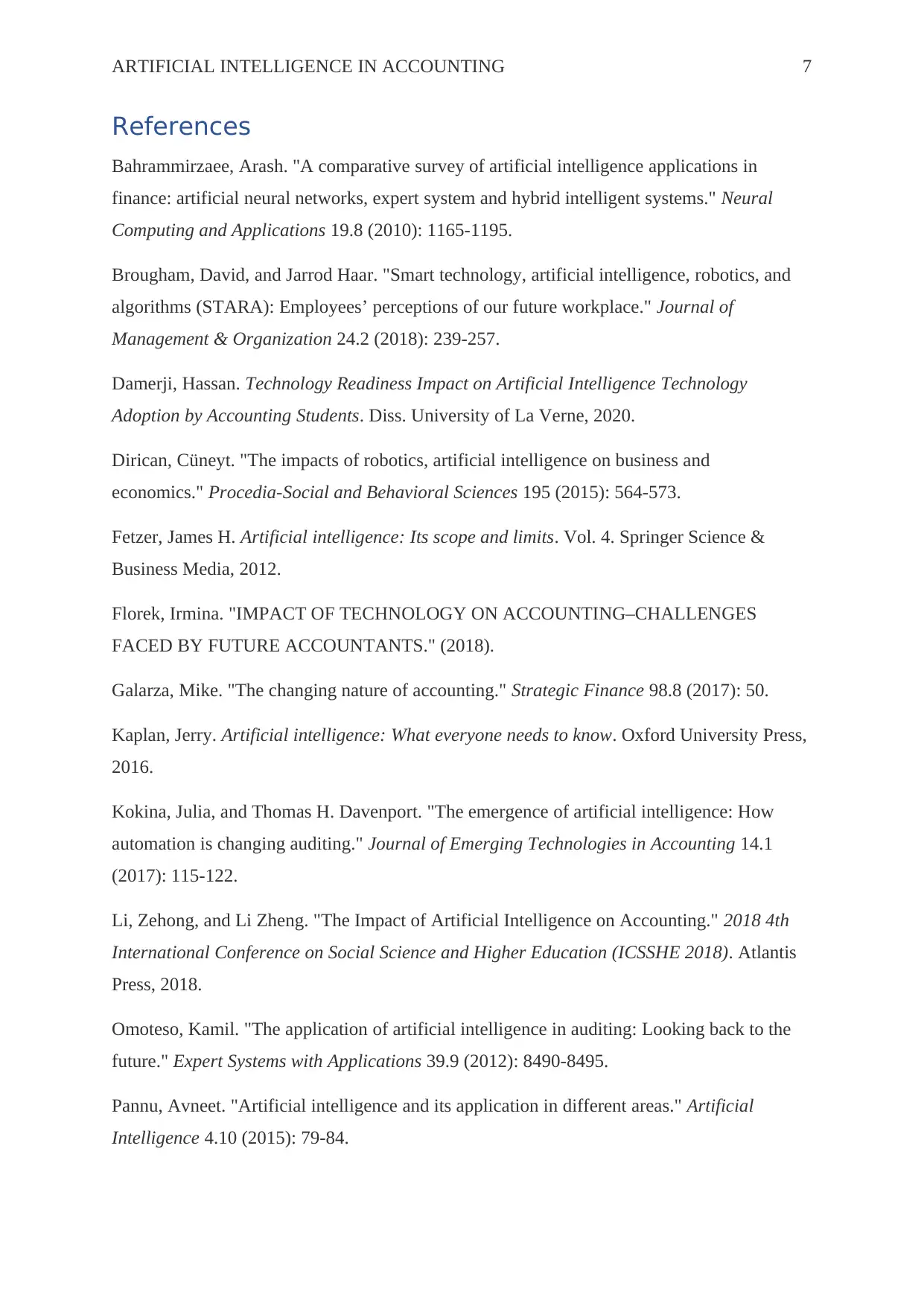
ARTIFICIAL INTELLIGENCE IN ACCOUNTING 7
References
Bahrammirzaee, Arash. "A comparative survey of artificial intelligence applications in
finance: artificial neural networks, expert system and hybrid intelligent systems." Neural
Computing and Applications 19.8 (2010): 1165-1195.
Brougham, David, and Jarrod Haar. "Smart technology, artificial intelligence, robotics, and
algorithms (STARA): Employees’ perceptions of our future workplace." Journal of
Management & Organization 24.2 (2018): 239-257.
Damerji, Hassan. Technology Readiness Impact on Artificial Intelligence Technology
Adoption by Accounting Students. Diss. University of La Verne, 2020.
Dirican, Cüneyt. "The impacts of robotics, artificial intelligence on business and
economics." Procedia-Social and Behavioral Sciences 195 (2015): 564-573.
Fetzer, James H. Artificial intelligence: Its scope and limits. Vol. 4. Springer Science &
Business Media, 2012.
Florek, Irmina. "IMPACT OF TECHNOLOGY ON ACCOUNTING–CHALLENGES
FACED BY FUTURE ACCOUNTANTS." (2018).
Galarza, Mike. "The changing nature of accounting." Strategic Finance 98.8 (2017): 50.
Kaplan, Jerry. Artificial intelligence: What everyone needs to know. Oxford University Press,
2016.
Kokina, Julia, and Thomas H. Davenport. "The emergence of artificial intelligence: How
automation is changing auditing." Journal of Emerging Technologies in Accounting 14.1
(2017): 115-122.
Li, Zehong, and Li Zheng. "The Impact of Artificial Intelligence on Accounting." 2018 4th
International Conference on Social Science and Higher Education (ICSSHE 2018). Atlantis
Press, 2018.
Omoteso, Kamil. "The application of artificial intelligence in auditing: Looking back to the
future." Expert Systems with Applications 39.9 (2012): 8490-8495.
Pannu, Avneet. "Artificial intelligence and its application in different areas." Artificial
Intelligence 4.10 (2015): 79-84.
References
Bahrammirzaee, Arash. "A comparative survey of artificial intelligence applications in
finance: artificial neural networks, expert system and hybrid intelligent systems." Neural
Computing and Applications 19.8 (2010): 1165-1195.
Brougham, David, and Jarrod Haar. "Smart technology, artificial intelligence, robotics, and
algorithms (STARA): Employees’ perceptions of our future workplace." Journal of
Management & Organization 24.2 (2018): 239-257.
Damerji, Hassan. Technology Readiness Impact on Artificial Intelligence Technology
Adoption by Accounting Students. Diss. University of La Verne, 2020.
Dirican, Cüneyt. "The impacts of robotics, artificial intelligence on business and
economics." Procedia-Social and Behavioral Sciences 195 (2015): 564-573.
Fetzer, James H. Artificial intelligence: Its scope and limits. Vol. 4. Springer Science &
Business Media, 2012.
Florek, Irmina. "IMPACT OF TECHNOLOGY ON ACCOUNTING–CHALLENGES
FACED BY FUTURE ACCOUNTANTS." (2018).
Galarza, Mike. "The changing nature of accounting." Strategic Finance 98.8 (2017): 50.
Kaplan, Jerry. Artificial intelligence: What everyone needs to know. Oxford University Press,
2016.
Kokina, Julia, and Thomas H. Davenport. "The emergence of artificial intelligence: How
automation is changing auditing." Journal of Emerging Technologies in Accounting 14.1
(2017): 115-122.
Li, Zehong, and Li Zheng. "The Impact of Artificial Intelligence on Accounting." 2018 4th
International Conference on Social Science and Higher Education (ICSSHE 2018). Atlantis
Press, 2018.
Omoteso, Kamil. "The application of artificial intelligence in auditing: Looking back to the
future." Expert Systems with Applications 39.9 (2012): 8490-8495.
Pannu, Avneet. "Artificial intelligence and its application in different areas." Artificial
Intelligence 4.10 (2015): 79-84.
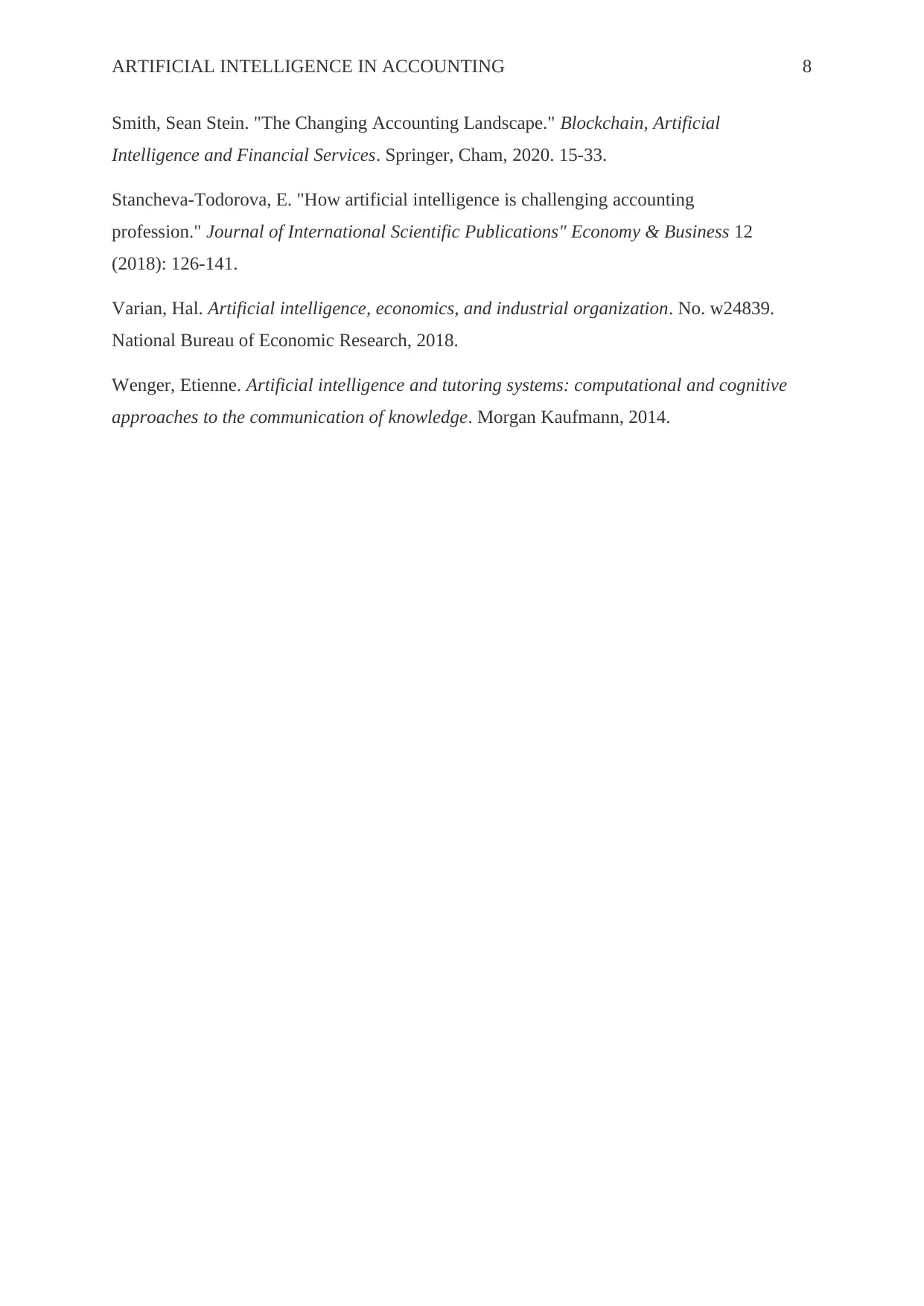
ARTIFICIAL INTELLIGENCE IN ACCOUNTING 8
Smith, Sean Stein. "The Changing Accounting Landscape." Blockchain, Artificial
Intelligence and Financial Services. Springer, Cham, 2020. 15-33.
Stancheva-Todorova, E. "How artificial intelligence is challenging accounting
profession." Journal of International Scientific Publications" Economy & Business 12
(2018): 126-141.
Varian, Hal. Artificial intelligence, economics, and industrial organization. No. w24839.
National Bureau of Economic Research, 2018.
Wenger, Etienne. Artificial intelligence and tutoring systems: computational and cognitive
approaches to the communication of knowledge. Morgan Kaufmann, 2014.
Smith, Sean Stein. "The Changing Accounting Landscape." Blockchain, Artificial
Intelligence and Financial Services. Springer, Cham, 2020. 15-33.
Stancheva-Todorova, E. "How artificial intelligence is challenging accounting
profession." Journal of International Scientific Publications" Economy & Business 12
(2018): 126-141.
Varian, Hal. Artificial intelligence, economics, and industrial organization. No. w24839.
National Bureau of Economic Research, 2018.
Wenger, Etienne. Artificial intelligence and tutoring systems: computational and cognitive
approaches to the communication of knowledge. Morgan Kaufmann, 2014.
⊘ This is a preview!⊘
Do you want full access?
Subscribe today to unlock all pages.

Trusted by 1+ million students worldwide
1 out of 9
Related Documents
Your All-in-One AI-Powered Toolkit for Academic Success.
+13062052269
info@desklib.com
Available 24*7 on WhatsApp / Email
![[object Object]](/_next/static/media/star-bottom.7253800d.svg)
Unlock your academic potential
Copyright © 2020–2026 A2Z Services. All Rights Reserved. Developed and managed by ZUCOL.




